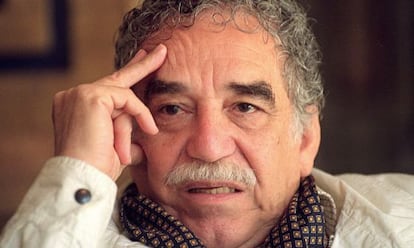Macondo in cyberspace
Gabriel García Márquez's 'One Hundred Years of Solitude' has been published digitally The writer is celebrating his 85th birthday, along with several other anniversaries in his career

Today kicks off a year of celebrations for Gabriel García Márquez, beginning with the Colombian novelist's 85th birthday. To mark the occasion, his Spanish-language publishers are launching an ebook edition of his iconic One Hundred Years of Solitude, first published 45 years ago. This year also marks the 30th anniversary of his Nobel Prize; 65 years since he published his first short story; and a decade on from when the first volume of his memoirs, Living to Tell The Tale, was published.
García Márquez's agent and long-standing friend Carmen Balcells has said that as well as sending the author his favorite yellow roses, as she does on his birthday, she will be emailing him a link so that he will be the first person to download a special first edition of the ebook of One Hundred Years of Solitude.
"My relationship with him has been such an enriching experience that I no longer remember when we began to be anchored together in that cloud of dreams, or indeed if we still are. It's a cloud that has transmuted into a digital version, where every book and every story can be stored," said Balcells in a press release to mark the release of the ebook.
Balcells says that for the moment she has no plans to publish digital editions of One Hundred Years of Solitude in English or any of the other 35 languages it has already been translated into.
When the book was published in English in 1970, the New York Times review read: "The family chronicle centers on five generations of descendants of José Arcadio Buendía and his wife Ursula, who, sometime early in the 19th century, founded the village of Macondo on a river of clear water somewhere in South America. The uncertainties about time and place, like other factual puzzles in the book, are not fashionable evasions on the part of the author but genuine reflections of the minds of the people about whom he is writing."
Aracataca was the inspiration for Macondo, while the Buendía's magically real household was based on his grandparent's house, where he grew up as the only child among grandparents and aunts, all of whom became characters in the novel's complex family chronicle. When Gabriel was an infant, his parents, who had 16 children, moved to another town where his father worked as a telegrapher, and Gabriel was left in the care of his grandparents. His grandfather, García Márquez has said, was "a former colonel who told endless stories of the civil war of his youth, took me to the circus and the cinema and was my umbilical cord with history and reality."
Grandmother was "always telling fables, family legends and organizing our life according to the messages she received in her dreams." She was "the source of the magical, superstitious and supernatural view of reality."
He began his literary apprenticeship as a journalist in the coastal town of Barranquilla, publishing his first short story at the age of 20 in daily newspaper El Espectador.
García Márquez has not written any fiction since his 2004 Memoires of My Melancholy Whores, which received mixed reviews. In 2009, Balcells told a Chilean newspaper that she "did not believe that the author would write anything else."
His memoires, Living to Tell the Tale, were released in 2002. The volume, covering the period until 1955 when Garcia Marquez had already beaten cancer, was initially meant to be the first of three.
It now seems unlikely that there will be any further volumes.
Tu suscripción se está usando en otro dispositivo
¿Quieres añadir otro usuario a tu suscripción?
Si continúas leyendo en este dispositivo, no se podrá leer en el otro.
FlechaTu suscripción se está usando en otro dispositivo y solo puedes acceder a EL PAÍS desde un dispositivo a la vez.
Si quieres compartir tu cuenta, cambia tu suscripción a la modalidad Premium, así podrás añadir otro usuario. Cada uno accederá con su propia cuenta de email, lo que os permitirá personalizar vuestra experiencia en EL PAÍS.
¿Tienes una suscripción de empresa? Accede aquí para contratar más cuentas.
En el caso de no saber quién está usando tu cuenta, te recomendamos cambiar tu contraseña aquí.
Si decides continuar compartiendo tu cuenta, este mensaje se mostrará en tu dispositivo y en el de la otra persona que está usando tu cuenta de forma indefinida, afectando a tu experiencia de lectura. Puedes consultar aquí los términos y condiciones de la suscripción digital.








































